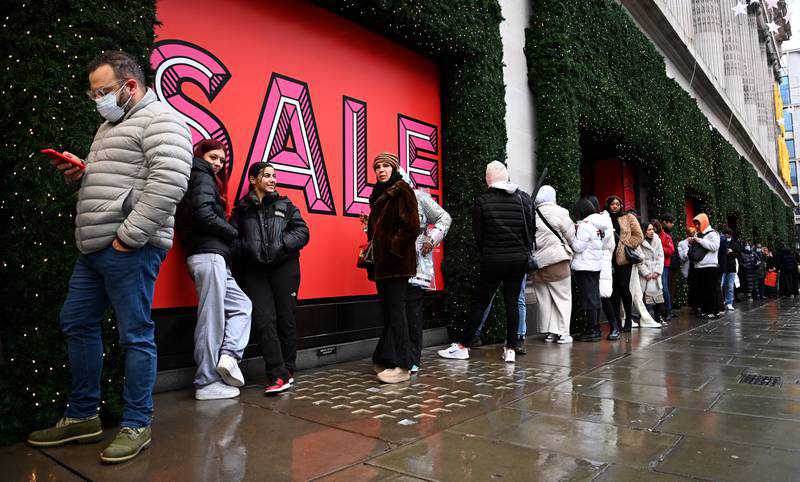London's West End suffers 44% drop in Boxing Day shoppers amid Omicron surge

The number of people shopping during Boxing Day sales in London’s West End plummeted this year, as many chose to avoid the city centre amid a surge in cases of the Omicron coronavirus variant in the UK.
Footfall around the shopping destinations of Oxford Street, Regent Street and Bond Street was almost half of pre-pandemic levels on Sunday, the first day after Christmas, when shoppers typically flood the capital on the hunt for bargains.
The West End Company, which represents 600 business across Oxford Street, Bond Street, Regent Street and in Mayfair, said footfall was 44 per cent below 2019 levels in the capital largely because of the emergence of the Londonvariant.
"As expected, footfall for Boxing Day remained down on pre-pandemic levels as London continues to feel the effects of the Omicron variant, with [many] people choosing to remain home to browse the sales online rather than risk travelling into city centres,” said Jace Tyrrell, chief executive of the West End Company.
Despite scenes of shoppers queuing outside stores such as Selfridges from the early hours of Boxing Day, separate data from retail expert Springboard showed footfall was 67 per cent lower this year than 2019 in central London, while it was 58 per cent below figures from the same year in other major UK cities.
Across the UK, footfall at shopping sites on Boxing Day was 45 per cent below the 2019 level, Springboard said.
However, market towns fared slightly better, with a 12 per cent decrease from 2019 shopping traffic, while there was only a seven per cent drop in outer London.
Britain is in the grip of a surge in Omicron infections with daily cases hitting a record of nearly 120,000 on Thursday, an increase of more than 10,000 on Wednesday’s caseload - which had also been a record.
The spread of Omicron has hit retailers at the worst possible time, because Christmas is when they tend to make most of their annual profit. London is particularly affected as government advice to work from home has meant office workers have deserted the capital at the same time as shoppers and tourists.
On Monday morning, there were some queues outside stores with pictures on social media showing masked shoppers waiting outside Next on Oxford Street from 4am.
New coronavirus restrictions came into force on Sunday across the UK, including wearing masks in all shops and limiting group sizes to six indoors.
"The spread of Omicron across the UK has increased the share of spending made online as many consumers avoided towns and city centres," said Tom Holder of the British Retail Consortium.
"While spending on travel and hospitality may be lower than their pre-pandemic levels, retailers are waiting to see whether this leads to higher spending on retail goods, particularly food and homeware."
The muted shopping scenes were also seen in the run up to Christmas Day with shopper numbers in central London on Christmas Eve 30 per cent lower than the previous Friday as the spread of the Omicron variant kept people at home, Springboard found.
City centres outside London saw a 10 per cent drop in shoppers in the hours up to midday on Christmas Eve versus a week earlier, the data showed.
The weak footfall figures are “synonymous with shoppers staying away from the capital and also large city centres generally,” said Diane Wehrle, marketing and insights director at Springboard.
Previous Story
- Space telescope launched on daring quest to behold...
- Asian stocks fall on concern about virus, tighter...
- Workers pressure governments worldwide to act on inflation
- Black Friday and early Christmas shopping give UK...
- COVID sparks Santa Claus shortage in U.S.
- Will the chip shortage create a nightmare before...
- Black Friday is not what it used to...
- 8 Detroit Festive Holiday Events to Light Up...